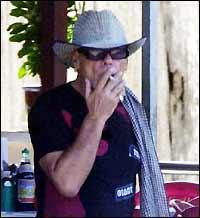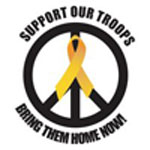Report challenges U.S. allegations against Macau bank
I, as did many other people, accepted the fact NKorea was producing millions in counterfeit US currency.
Well, It turns out it is probable they produced no more counterfeit money than did you or I.
Shocked? Astounded?
You are a fool. You took your information from the Bush administration. I personally feel like an ass.
Jesus H Christ on a sail boat, can anything the Bush administration says be believed?
So, based on cooked evidence, Bush pushes NKorea closer to becoming a nuclear power. So nice. Gawd I love my country!
(read more)
Well, It turns out it is probable they produced no more counterfeit money than did you or I.
Shocked? Astounded?
You are a fool. You took your information from the Bush administration. I personally feel like an ass.
Jesus H Christ on a sail boat, can anything the Bush administration says be believed?
Charges by the U.S. Treasury Department that a small bank in Macau knowingly laundered counterfeit U.S. currency on behalf of North Korea have no basis in fact, according to a confidential audit ordered by the government of the Chinese enclave.
The audit, obtained by McClatchy News Service, also suggests that the Treasury overstated claims that the bank laundered ''hundreds of millions'' in ill-gotten gains through Banco Delta Asia.
On the basis of the allegations, the Treasury Department on March 14 blacklisted the tiny, family-controlled bank, which now is on the verge of being driven out of business.
The Bush administration now says it approves the release of $25 million originally frozen in Macau at Washington's behest, but portions of this Banco Delta Asia money tied to North Korea apparently have not been received by the regime's leaders. Consequently, they missed Saturday's deadline to begin dismantling a nuclear reactor as agreed to on Feb. 13 as part of an agreement with the United States and four other nations.
''From our investigations it is apparent that . . . the Bank did not introduce counterfeit U.S. currency notes into circulation,'' the Ernst & Young audit said, noting that large cash deposits from North Korea were routinely screened for counterfeits by the Hong Kong branch of an unidentified bank with U.S. operations.
CASTING DOUBT
The audit's conclusions about the laundering of counterfeit currency are significant because they cast doubt on Bush administration claims that North Korea has engaged in state-sponsored counterfeiting and introducing these fake bills via Banco Delta.
Moreover, the audit confirmed that the only time Banco Delta knowingly handled counterfeit U.S. notes was in 1994 when its inspectors discovered 100 counterfeit $100 bills and turned over $10,000 to local authorities. That $10,000 is far from the $15 million in counterfeit U.S. currency the Bush administration in 2005 said North Korea was manufacturing annually.
Ernst & Young presented the audit to Macanese banking regulators in December 2005 in response to concerns raised in Treasury's Sept. 20, 2005, proposed action against Banco Delta. The bank's lawyers offered to present the report to Treasury officials in October 2006 but insisted that it be excluded from access under the Freedom of Information Act -- in other words kept secret from the media. Treasury refused the offer.
The copy of the audit obtained by McClatchy News Service excises the names of North Korean entities and officials to protect their identities. The names of some banks with U.S. ties are also redacted.
Until now, the story of Banco Delta's travails has played out behind a wall of secrecy imposed by U.S., Chinese and Macanese regulators. But the audit, aspects of which were reported earlier by McClatchy News Service, for the first time spells out exactly what Treasury's concerns were and what international auditors discovered.
So, based on cooked evidence, Bush pushes NKorea closer to becoming a nuclear power. So nice. Gawd I love my country!
(read more)
Labels: Bush administration, Macau, NKorea














0 Comments:
Post a Comment
<< Home